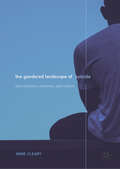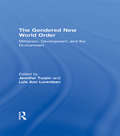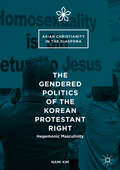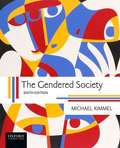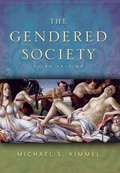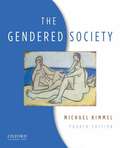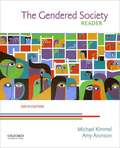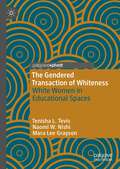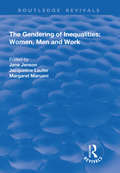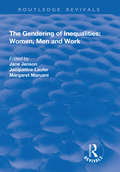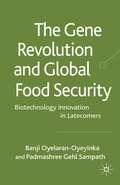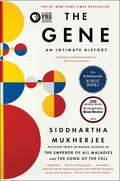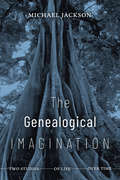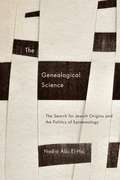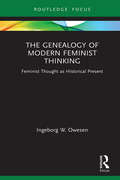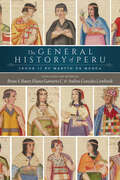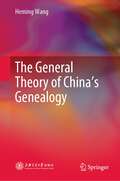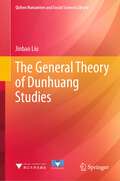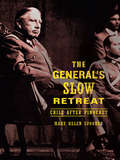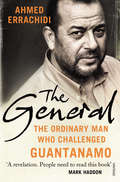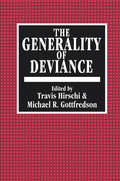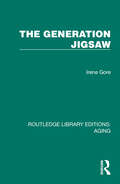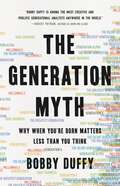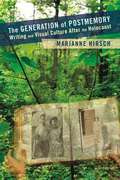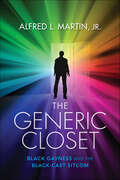- Table View
- List View
The Gendered Landscape of Suicide: Masculinities, Emotions, and Culture
by Anne ClearyThis book is an attempt to understand suicide from the perspective of a group of men who decided to take their own lives. Their stories imply that male suicide is not, as frequently portrayed, an impulsive action arising from particular, sex-specific, causes but relates to a cluster of interlinked issues which accumulate over time. These issues were not distinctively male concerns but were connected to gender in that the men’s difficulties were exacerbated by the existence of an emotional culture which inhibited males from expressing specific feelings. The prevailing form of masculinity impeded them in developing knowledge of, and speaking about, their emotional needs and from accessing help and this prolonged their suffering and made suicide a possibility. These men produced compelling accounts of their emotional pain which belied notions of male inexpressiveness but the findings point to a link between emotionally constraining cultures and suicidal behaviour for some groups of men.
The Gendered New World Order: Militarism, Development, and the Environment
by Lois Ann Lorentzen Jennifer TurpinEcological security seems increasingly precarious and battles over land and models of economic development now lead to military conflicts. The Gendered New World Order addresses the compelling issue of how gender connects the global problems of militarism, underdevelopment, and environmental decay. Scholars from around the world make connections between seemingly disparate issues such as refugees, polluted waters, bombed vilages, massive dam projects, starving children, deforestation, nuclear arms buildup and the rights of women.
The Gendered Politics of the Korean Protestant Right: Hegemonic Masculinity (Asian Christianity in the Diaspora)
by Nami KimThis book provides a critical feminist analysis of the Korean Protestant Right’s gendered politics. Specifically, the volume explores the Protestant Right’s responses and reactions to the presumed weakening of hegemonic masculinity in Korea’s post-hypermasculine developmentalism context. Nami Kim examines three phenomena: Father School (an evangelical men’s manhood and fatherhood restoration movement), the anti-LGBT movement, and Islamophobia/anti-Muslim racism. Although these three phenomena may look unrelated, Kim asserts that they represent the Protestant Right’s distinct yet interrelated ways of engaging the contested hegemonic masculinity in Korean society. The contestation over hegemonic masculinity is a common thread that runs through and connects these three phenomena. The ways in which the Protestant Right has engaged the contested hegemonic masculinity have been in relation to “others,” such as women, sexual minorities, gender nonconforming people, and racial, ethnic, and religious minorities.
The Gendered Society
by Michael KimmelThe sixth edition of The Gendered Society explores current thinking about gender, both inside academia and in our everyday lives. Michael Kimmel challenges the claim that gender is limited to women's experiences--his compelling and balanced study of gender includes both masculine and feminine perspectives. Kimmel makes three bold and persuasive statements about gender. First, he demonstrates that gender differences are often extremely exaggerated; in fact, he argues that men and women have much more in common than we think they do. Kimmel also challenges the pop psychologists who suggest that gender difference is the cause of inequality between the sexes; instead, he reveals that the reverse is true-gender inequality itself is the cause of the differences between men and women. Finally, he illustrates that gender is not merely an element of individual identity, but a socially constructed institutional phenomenon.
The Gendered Society (3rd edition)
by Michael S. KimmelThoroughly updated and revised, the third edition of The Gendered Society explores current thinking about gender, both inside academia and in our everyday lives.
The Gendered Society (4th edition)
by Michael S. KimmelThoroughly updated throughout, the fourth edition of The Gendered Society explores current thinking about gender, both inside academia and in our everyday lives. Michael Kimmel challenges the claim that gender is limited to women's experiences-his compelling and balanced study of gender includes both masculine and feminine perspectives. Kimmel makes three bold and persuasive statements about gender. First, he demonstrates that gender differences are often extremely exaggerated; in fact, he argues that men and women have much more in common than we think they do. Kimmel also challenges the pop psychologists who suggest that gender difference is the cause of inequality between the sexes; instead, he reveals that the reverse is true-gender inequality itself is the cause of the differences between men and women. Finally, he illustrates that gender is not merely an element of individual identity, but a socially constructed institutional phenomenon. Essential reading for both students and scholars, The Gendered Society is an authoritative, incisive, and lively statement about contemporary gender relations from one of the country's foremost thinkers on the subject.
The Gendered Society Reader
by Michael Kimmel Amy AronsonIn The Gendered Society Reader, Sixth Edition, coeditors Michael Kimmel and Amy Aronson pull together an array of dynamic voices--both male and female, classic and contemporary--to examine various interpretations of gender. These lively, in-depth readings explore gender discourse over a wide range of disciplines, focusing primarily on two central issues: difference and domination. Carefully balanced to reflect the diversity of its subject, this text addresses provocative and fundamental questions including: * How are males and females different? * What do these differences mean? * How to various cultures and religions interpret gender? * Why do societies continue to differentiate people on the basis of gender? * Why is it that almost every known society is based on male domination? Thoroughly updated with rich and timely material, the sixth edition is the perfect complement to Michael Kimmel's textbook, The Gendered Society, Sixth Edition (OUP, 2016).
The Gendered Transaction of Whiteness: White Women in Educational Spaces
by Tenisha L. Tevis Naomi W. Nishi Mara Lee GraysonThis book considers the causes and effects of an education field that remains white and gendered and critically examines how the race-gendered power afforded to white women in educational spaces is transacted through instructional practices and interpersonal interactions. White women occupy a complex position in society within systems of white supremacy and patriarchy, participating as both oppressors and oppressed. Emphasizing the consequences of whiteness for educational professionals and students of all racial identities, the chapters in this book offer strategies for identifying and moving beyond the gendered transaction of whiteness, including what white women can do instead and how all educators can work toward transformative antiracist education.
The Gendering of Inequalities: Women, Men and Work
by JANE JENSON; JACQUELINE LAUFER; MARGARET MARUANIThis was first published in 2000: This work is founded on the premise that many analyses of economic restructuring and of gender relations fail to recognize two things. First, the situation facing women is different from that of the 1960s when the conceptual apparatuses for analyzing "women and work" were created. Labour markets are dominated by flexible, non-standard work, precarious contractual relations and income disparities. Therefore, it is difficult to structure political claims or analysis around the notion that there is a single labour market, that the primary problem is discrimination or inappropriate training, and that political strategies should focus on discrimination and non-traditional employment. Rather, new challenges require new solutions. The second point of departure is that is is impossible to understand either contemporary labour markets, or the roots of employment and other public policies without locating them vis a vis patterns of gender inequalities generated by and in these labour markets. The labour force has been feminized to such an extent that new, and often unequal gender relations are crucial to their very functioning.
The Gendering of Inequalities: Women, Men and Work
by Jane Jenson Jacqueline Laufer Margaret MaruaniThis was first published in 2000: This work is founded on the premise that many analyses of economic restructuring and of gender relations fail to recognize two things. First, the situation facing women is different from that of the 1960s when the conceptual apparatuses for analyzing "women and work" were created. Labour markets are dominated by flexible, non-standard work, precarious contractual relations and income disparities. Therefore, it is difficult to structure political claims or analysis around the notion that there is a single labour market, that the primary problem is discrimination or inappropriate training, and that political strategies should focus on discrimination and non-traditional employment. Rather, new challenges require new solutions. The second point of departure is that is is impossible to understand either contemporary labour markets, or the roots of employment and other public policies without locating them vis a vis patterns of gender inequalities generated by and in these labour markets. The labour force has been feminized to such an extent that new, and often unequal gender relations are crucial to their very functioning.
The Gene Revolution and Global Food Security: Biotechnology Innovation in Latecomers
by Banji Oyelaran-Oyeyinka Padmashree Gehl SampathUsing the concept of innovation capacity, this book, using recent field data from countries in Asia and Africa, competently demonstrates how biotechnology can contribute to sustainable economic development. The approach articulates the imperative for developing countries to build up specific capabilities backed up by policies and institutions.
The Gene: An Intimate History
by Siddhartha Mukherjee<P>From the Pulitzer Prize-winning, bestselling author of The Emperor of All Maladies--a magnificent history of the gene and a response to the defining question of the future: What becomes of being human when we learn to "read" and "write" our own genetic information? <P>The extraordinary Siddhartha Mukherjee has a written a biography of the gene as deft, brilliant, and illuminating as his extraordinarily successful biography of cancer. Weaving science, social history, and personal narrative to tell us the story of one of the most important conceptual breakthroughs of modern times, Mukherjee animates the quest to understand human heredity and its surprising influence on our lives, personalities, identities, fates, and choices. <P>Throughout the narrative, the story of Mukherjee's own family--with its tragic and bewildering history of mental illness--cuts like a bright, red line, reminding us of the many questions that hang over our ability to translate the science of genetics from the laboratory to the real world. In superb prose and with an instinct for the dramatic scene, he describes the centuries of research and experimentation--from Aristotle and Pythagoras to Mendel and Darwin, from Boveri and Morgan to Crick, Watson and Franklin, all the way through the revolutionary twenty-first century innovators who mapped the human genome. <P>As The New Yorker said of The Emperor of All Maladies, "It's hard to think of many books for a general audience that have rendered any area of modern science and technology with such intelligence, accessibility, and compassion...An extraordinary achievement." <P>Riveting, revelatory, and magisterial history of a scientific idea coming to life, and an essential preparation for the moral complexity introduced by our ability to create or "write" the human genome, The Gene is a must-read for everyone concerned about the definition and future of humanity. This is the most crucial science of our time, intimately explained by a master. <P><b>A New York Times Bestseller</b>
The Genealogical Imagination: Two Studies of Life over Time
by Michael JacksonIn The Genealogical Imagination Michael Jackson juxtaposes ethnographic and imaginative writing to explore intergenerational trauma and temporality. Drawing on over fifty years of fieldwork, Jackson recounts the 150-year history of a Sierra Leone family through its periods of prosperity and powerlessness, war and peace, jihad and migration. Jackson also offers a fictionalized narrative loosely based on his family history and fieldwork in northeastern Australia that traces how the trauma of wartime in one generation can reverberate into the next. In both stories Jackson reflects on different modes of being-in-time, demonstrating how genealogical time flows in stops and starts—linear at times, discontinuous at others—as current generations reckon with their relationships to their ancestors. Genealogy, Jackson demonstrates, becomes a powerful model for understanding our experience of being-in-the-world, as nobody can escape kinship and the pull of the past. Unconventional and evocative, The Genealogical Imagination offers a nuanced account of how lives are lived, while it pushes the bounds of the forms that scholarship can take.
The Genealogical Science: The Search for Jewish Origins and the Politics of Epistemology (Chicago Studies in Practices of Meaning)
by Nadia Abu El-HajThe Genealogical Science analyzes the scientific work and social implications of the flourishing field of genetic history. A biological discipline that relies on genetic data in order to reconstruct the geographic origins of contemporary populations—their histories of migration and genealogical connections to other present-day groups—this historical science is garnering ever more credibility and social reach, in large part due to a growing industry in ancestry testing. In this book, Nadia Abu El-Haj examines genetic history’s working assumptions about culture and nature, identity and biology, and the individual and the collective. Through the example of the study of Jewish origins, she explores novel cultural and political practices that are emerging as genetic history’s claims and “facts” circulate in the public domain and illustrates how this historical science is intrinsically entangled with cultural imaginations and political commitments. Chronicling late-nineteenth- to mid-twentieth-century understandings of race, nature, and culture, she identifies continuities and shifts in scientific claims, institutional contexts, and political worlds in order to show how the meanings of biological difference have changed over time. In so doing she gives an account of how and why it is that genetic history is so socially felicitous today and elucidates the range of understandings of the self, individual and collective, this scientific field is making possible. More specifically, through her focus on the history of projects of Jewish self-fashioning that have taken place on the terrain of the biological sciences, The Genealogical Science analyzes genetic history as the latest iteration of a cultural and political practice now over a century old.
The Genealogy of Modern Feminist Thinking: Feminist Thought as Historical Present (Routledge Research in Gender and Society)
by Ingeborg W. OwesenWithin much contemporary feminist theory there is a tendency to forget or ignore its own historicity and consider itself as primarily oriented towards the present. This book explores the historical roots of some of feminism's central concepts and debates, examining the philosophical conditions for feminist thought and taking as its point of departure the dynamic relationship between feminist thought and the history of philosophy. With close attention to the genealogy of key concepts such as equality, sex/gender and difference, alongside discussions of contemporary gender equality policy and contextual understandings of central figures including Wollstonecraft, Beauvoir and Irigaray, The Genealogy of Modern Feminist Thinking provides an analysis of feminism from its origins in the early modern period to its contemporary, post-modern forms. Shedding light on feminism as a product of modernity and establishing it as part of the canon of European intellectual development, this book thus corrects the picture of feminism as a phenomenon that lacks historical continuity, revealing a history characterized by breaks, setbacks and forgetting, in which the forgetting itself forms part of a rich genealogy. As such, it will be of interest to philosophers, sociologists, political theorists and intellectual historians alike.
The General History of Peru: Book 1
by Martín de MurúaMercedarian friar Martín de Murúa’s General History of Peru (Historia General del Piru, 1616) is one of the most significant Spanish chronicles of Inca history and Peru’s early colonial period yet to be published in English. Written over several decades and approved by King Philip III for publication, Murúa’s magnificent manuscript disappeared from public view for nearly 350 years until its publication in 1964. Here, translators Brian S. Bauer, Eliana Gamarra C., and Andrea Gonzales Lombardi present the first English translation of Book 1 of Murúa’s comprehensive three-part work. Book 1 covers both the history of the Inca Empire and the first forty years of the Spanish occupation, up to and including the fall of Vilcabamba in 1572. While the J. Paul Getty Museum produced a digital facsimile of Murúa’s full Historia in 2008, it remained underused and, until now, untranslated. This translation revitalizes the momentous early volume with an introduction offering a window into Murúa’s life and the writing of his Historia, and extensive footnotes that provide the scholarly context of Murúa’s work. This edition of The General History of Peru: Book 1 provides long-awaited access to Murúa’s contribution to Indigenous Andean history and early colonial Peru. The book is valuable for English-speaking students and scholars of pre-Hispanic Andean history, especially those interested in the ancient Andean world and colonial Peru’s literary production.
The General Theory of China’s Genealogy
by Heming WangThis book offers the first comprehensive and systematic introduction to the origins and development of China’s genealogy, as well as its fundamental role in eugenics, ethics, politics and culture throughout China’s history. This book is divided into two parts: chronological research and thematic research. The first part explains the definition, origin, birth, development, transformation, optimization, popularization and contemporary status of China’s genealogy, while the second addresses its styles, content, quantity, family names, format and value, illustrations, functions and other related issues. The book, for the first time in China’s genealogy, proposes several new concepts and perspectives, such as dividing the history of China’s genealogy into seven stages; redefining genealogy; and analyses of the transformation, popularization and value of China’s genealogy. Given its scope, the book offers a groundbreaking and authoritative resource for a broad readership.
The General Theory of Dunhuang Studies (Qizhen Humanities and Social Sciences Library)
by Jinbao LiuDunhuang studies refer to a discipline focusing on Dunhuang Manuscripts, Dunhuang grotto art, the theory of Dunhuang studies, and Dunhuang history and geography. It is a broad subject of studying, excavating, sorting, and protecting the cultural relics and documents in the Dunhuang area of China.The General Theory of Dunhuang Studies explores the basic concept of Dunhuang studies. It presents a more comprehensive and systematic study of six aspects of Dunhuang, covering the background of Dunhuang studies in orientalism, the history of Dunhuang, Dunhuang grotto art, the scattering of Dunhuang cultural relics, Dunhuang manuscripts, and the history of Dunhuang studies, and discussing and summarizing the relevant national and international research.The General Theory of Dunhuang Studies has extensively absorbed the research achievements of domestic and foreign academic circles and the author's decades of academic research experience. As a comprehensive and systematic academic monograph with both academic depth and extensive readability, the book provides descriptions, theory and objective comments written in a clear and straightforward style; the book is intended for professional scholars, graduates and general readers. It is an excellent teaching and learning resource for those interested in understanding and learning about Dunhuang studies. However, it is also a helpful reference book for readers interested in Dunhuang culture.
The General's Slow Retreat
by Mary Helen SpoonerIn her acclaimed book Soldiers in a Narrow Land, Mary Helen Spooner took us inside the brutal dictatorship of Augusto Pinochet. Carrying Chile's story up to the present, she now offers this vivid account of how Chile rebuilt its democracy after 17 years of military rule--with the former dictator watching, and waiting, from the sidelines. Spooner discusses the major players, events, and institutions in Chile's recent political history, delving into such topics as the environmental situation, the economy, and the election of Michelle Bachelet. Throughout, she examines Pinochet's continuing influence on public life as she tells how he grudgingly ceded power, successfully fought investigations into his human rights record and finances, kept command of the army for eight years after leaving the presidency, was detained on human rights charges, and died without being convicted of any of the many serious crimes of which he was accused. Chile has now become one of South America's greatest economic and political successes, but as we find in The General's Slow Retreat, it remains a country burdened with a painful past.
The General: The ordinary man who challenged Guantanamo
by Gillian Slovo Ahmed ErrachidiOn 11 September 2001, in a café in London, Ahmed Errachidi watched as the twin towers collapsed. He was appalled by the loss of innocent life. But he couldn’t possibly have predicted how much of his own life he too would lose because of that day.In a series of terrible events, Ahmed was sold by the Pakistanis to the Americans in the diplomatic lounge at Islamabad airport and spent five and a half years in Guantanamo. There, he was beaten, tortured, humiliated, very nearly destroyed.But Ahmed did not give in. This very ordinary, Moroccan-born London chef became a leader of men. Known by the authorities as The General, he devised protests and resistance by any means possible. As a result, he spent most of his time in solitary confinement. But then, after all those years, Ahmed was freed, his innocence admitted.This is Ahmed’s story. It will make you rethink what it means to be in the wrong place at the wrong time. It will also make you look anew at courage, survival, justice and the War on Terror.
The Generality of Deviance
by Michael R. Gottfredson Travis HirschiFirst Published in 2018. Routledge is an imprint of Taylor & Francis, an Informa company.
The Generation Jigsaw (Routledge Library Editions: Aging)
by Irene GoreIn The Generation Jigsaw, originally published in 1976, Irene Gore explores some of the problems which face older people in the family and the community. Her attitude, differing from many attitudes and practices at the time, was that people in old age are capable of expanding their interests and activities, given encouragement and opportunity.Dr Gore is specifically not concerned with ill people, invalids or the severely disadvantaged. ‘It is my conviction’, she writes, ‘that the problems of the reasonably fit, reasonably independent majority of older people deserve to be considered … The injunction to honour one’s father and mother is part of our ethic, and we traditionally interpret this as “taking care” of them. But “taking care” of older people carries the risk of making them too passive and dependent, of blurring their individuality.’ Whereas in former times a person had a position to look forward to in later years – the regard of the family and the community and the status that experience gave – now the tendency is to channel and guide our elders into a mode of life which someone else thinks is best for them.Dr Gore points the way forward to a livelier, more fulfilled community of people of all ages. She has a scientifically trained mind capable of seeing to the core of the problem, and a genuine concern for the true welfare of older people – and of their younger relatives who will become old in their turn. She approaches her subject with lucidity and an unsentimental humanity, based on years of research on the biological aspects of ageing and hard thinking about the personal and social problems encountered by the elderly. She dispels myths and suggests commonsense solutions and guidelines for improving the quality of life for us all.
The Generation Myth: Why When You're Born Matters Less Than You Think
by Bobby DuffyMillennials, Baby Boomers, Gen Z—we like to define people by when they were born, but an acclaimed social researcher explains why we shouldn't.Boomers are narcissists. Millennials are spoiled. Gen Zers are lazy. We assume people born around the same time have basically the same values. It makes for good headlines, but is it true?Bobby Duffy has spent years studying generational distinctions. In The Generation Myth, he argues that our generational identities are not fixed but fluid, reforming throughout our lives. Based on an analysis of what over three million people really think about homeownership, sex, well-being, and more, Duffy offers a new model for understanding how generations form, how they shape societies, and why generational differences aren&’t as sharp as we think.The Generation Myth is a vital rejoinder to alarmist worries about generational warfare and social decline. The kids are all right, it turns out. Their parents are too.
The Generation of Postmemory: Writing and Visual Culture After the Holocaust (Gender and Culture Series)
by Marianne HirschCan we remember other people's memories? The Generation of Postmemory argues we can: that memories of traumatic events live on to mark the lives of those who were not there to experience them. Children of survivors and their contemporaries inherit catastrophic histories not through direct recollection but through haunting postmemories-multiply mediated images, objects, stories, behaviors, and affects passed down within the family and the culture at large. In these new and revised critical readings of the literary and visual legacies of the Holocaust and other, related sites of memory, Marianne Hirsch builds on her influential concept of postmemory. The book's chapters, two of which were written collaboratively with the historian Leo Spitzer, engage the work of postgeneration artists and writers such as Art Spiegelman, W.G. Sebald, Eva Hoffman, Tatana Kellner, Muriel Hasbun, Anne Karpff, Lily Brett, Lorie Novak, David Levinthal, Nancy Spero and Susan Meiselas. Grappling with the ethics of empathy and identification, these artists attempt to forge a creative postmemorial aesthetic that reanimates the past without appropriating it. In her analyses of their fractured texts, Hirsch locates the roots of the familial and affiliative practices of postmemory in feminism and other movements for social change. Using feminist critical strategies to connect past and present, words and images, and memory and gender, she brings the entangled strands of disparate traumatic histories into more intimate contact. With more than fifty illustrations, her text enables a multifaceted encounter with foundational and cutting edge theories in memory, trauma, gender, and visual culture, eliciting a new understanding of history and our place in it.
The Generic Closet: Black Gayness and the Black-Cast Sitcom
by Alfred L. Martin Jr.Even after a rise in gay and Black representation and production on TV in the 1990s, the sitcom became a "generic closet," restricting Black gay characters with narrative tropes.Drawing from 20 interviews with credited episode writers, key show-runners, and Black gay men, The Generic Closet situates Black-cast sitcoms as a unique genre that uses Black gay characters in service of the series' heterosexual main cast. Alfred L. Martin, Jr., argues that the Black community is considered to be antigay due to misrepresentation by shows that aired during the family viewing hour and that were written for the imagined, "traditional" Black family. Martin considers audience reception, industrial production practices, and authorship to unpack the claim that Black gay characters are written into Black-cast sitcoms such as Moesha, Good News, and Let's Stay Together in order to closet Black gayness.By exploring how systems of power produce ideologies about Black gayness, The Generic Closet deconstructs the concept of a monolithic Black audience and investigates whether this generic closet still exists.
